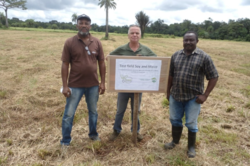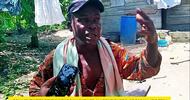Mongabay | 9 October 2023
by Maxwell Radwin
Government and NGOs on edge
Plan to bring Mennonite farmers to Suriname sparks deforestation fears
by Maxwell Radwin
Foreign land developers have spent the past several years working to bring Mennonite farming communities from across Latin America to Suriname with the plan of starting a series of agriculture projects — a major threat to conservation efforts in the country’s part of the Amazon Rainforest, environmentalists say.
Investors from Argentina and the Netherlands launched a campaign to bring Mennonite farmers to Suriname from Belize, Mexico and Bolivia, where members of the religiously conservative group have already faced criticism for clearing thousands of hectares of forest.
The company behind the project is called Terra Invest Suriname & Guyana, and advertises itself as an expert in large-scale agriculture projects for soy, maize, sorghum and wheat. Since its founding in 2021, the company has hosted Mennonite communities in Suriname, visited properties for potential purchase, and initiated talks with the government.
“This is serious business,” said Ben D’Leon, a member of the NGO Amazon Conservation Team, Suriname. “They’re possibly aiming to use pristine forest to make their agricultural lands.”
Terra Invest says it aims to secure a total of 30,000 hectares (about 74,000 acres) for approximately 1,000 Mennonite families, each responsible for farming between 30 and 50 hectares (74-124 acres). Although Terra Invest is in talks with the government, it told Mongabay that a land purchase is still in the early stages and “very hypothetical.”
So far, Suriname’s Ministry of Foreign Affairs has greenlit a pilot project that allows 50 Mennonite families to travel to the country and work in the agricultural sector for up to three years.
Some environmental groups are worried Terra Invest’s plans will snowball to as much as 90,000 hectares (more than 222,000 acres). The company has looked at sites in the districts of Para, Saramacca, Commewijne, Nickerie, Marowijne, Brokopondo and Sipaliwini, and in the town of Apoera. It declined to say which areas are being discussed with the government.
In neighboring Guyana, it looked at the region of Upper Demerara-Berbice and East Berbice-Corentyne with the hope of purchasing plots larger than 5,000 hectares (12,400 acres) for “long-term” ownership, according to its social media pages. But progress was slow and interest from the government wasn’t as strong, so the company has kept its focus on Suriname.
Terra Invest has received interest from four Mennonite colonies in Bolivia and two in Belize. Last December, the company also hosted interested Mennonites from Mexico for nine days, according to a post on its Facebook page.
The strongest interest has come from communities in Santa Cruz, Bolivia, a hotspot for deforestation. Between 2001 and 2021, Mennonite farmers cleared 210,980 hectares (521,343 acres) in the southern Bolivian Amazon — nearly a third of all deforestation in that area, according to a report from Amazon Conservation’s Monitoring of the Andean Amazon Project (MAAP).
Locals there said communities are growing so fast that some are looking to relocate to other parts of the continent.
“They completely deforest everything,” said Julio Eguez, an Indigenous leader, or cacique, in San Rafael de Velasco, Bolivia. “And when the land stops being good enough for production, they abandon it and go somewhere else.
Small company, big goals
Two people act as the face of Terra Invest. Ruud Souverein is a Dutch businessman living in Suriname, a former Dutch colony, and has a background in marketing, agribusiness and processed foods. Adrián Barbero, who bills himself as “the first developer of Mennonite projects in Suriname and Guyana,” is an Argentinian real estate entrepreneur and farmer living in Santa Cruz, Bolivia, where he has spent the past 20 years brokering land deals with Mennonite and other farmers.
Barbero said he considers Mennonites to be his friends. He said he wants to help them navigate the legal system, escape religious persecution, and find better economic opportunities. As some Mennonite communities have grown in Latin America, younger generations haven’t been able to establish farms with the same success. He said starting new colonies in Suriname might fix the problem.
“They’re young people who no longer have land in other countries,” Barbero told Mongabay. “[In Suriname], they can resettle their lives with a piece of land.”
Barbero has curated his social media presence to come across as a champion of the Mennonites, even calling himself an “agro-influencer” while posting on Facebook and TikTok about new farming projects and efforts to expand. Mennonites themselves traditionally don’t use modern technology.
In one video, he shows Mennonites on a ferry crossing a river in Guyana. In another, he’s shopping for heavy farming machinery in Suriname.
Once Mennonites are settled in Suriname, Barbero said their farms could grow corn and soybeans to meet the domestic demand for chicken feed. Poultry is traditionally Suriname’s most-consumed meat product, but rising prices on the global market have made it harder to obtain. Domestically grown feed could help lower the price and improve food security, Barbero said.
He’s also working on finding seed suppliers. Brazil isn’t an option because it uses genetically modified seeds and grows them using the herbicide glyphosate, which is banned in Suriname. He said he expects to import seeds from a company in the U.S. or Europe that will be more easily approved by Suriname’s Ministry of Agriculture.
Terra Invest has already been in contact with the ministry, Barbero said. The ministry didn’t respond to Mongabay’s interview request.
Following the letter of the law as closely as possible, which hasn’t always been the case for Mennonite farmers, is a priority for Terra Invest, Barbero said. The company will also carry out environmental impact studies and take steps to ensure the Mennonites have as little ecological impact as possible. They plan to clear only 50% of the land, he added.
“We want to make sure the legal framework is correct,” he said. “We’re working within an interesting legal framework and we proposed that we make as little impact as possible.”
Government and NGOs on edge
More than 90% of Suriname is covered by the Amazon Rainforest. The country has struggled with gold mining over the years — both a top export earner and a main driver of deforestation — but overall it’s managed to avoid the kind of economic development that might compromise its forests.
It’s one of just three countries with a carbon-negative economy, meaning its forests absorb more carbon dioxide than the country emits — a huge help in the fight against climate change.
But the government is also facing a financial crisis. A growing fiscal deficit and high inflation have forced it, among other things, to restructure its debt with the IMF. High costs of living and food scarcity caused by floods have sparked nationwide protests. The need for revenue is at an all-time high, and agricultural production sounds appealing to some lawmakers.
“If you need development, there are consequences,” Gregory Rusland, a representative in the National Assembly and former minister of natural resources, told Mongabay. “We’re keen on maintaining our nature, but at a certain point you need food production.”
President Chan Santokhi, a former police chief who took office in 2020, tried to strike a balance between conservation and the economy when he proposed selling carbon credits under a framework established by the 2015 Paris Agreement. The plan would keep the country’s trees in the ground while generating some much-needed revenue.
But Santokhi has also expressed interest in the Mennonite pilot project approved by the Ministry of Foreign Affairs, despite the Mennonites’ history of encroaching on projects tied to carbon credits, such as protected areas and Indigenous territories.
Suriname is the only Amazonian country that hasn’t legally recognized Indigenous land rights. The idea that the government is negotiating with foreign Mennonite farmers while Indigenous people still go unrecognized has frustrated many local communities as well as members of the National Assembly, who have spent years pushing for a vote on the issue.
“We don’t have our land rights,” said Iona Edwards, an Indigenous Lokono serving in the National Assembly. “You can’t bring another group into our community where we already are expecting help from the government.”
The Ministry of Foreign Affairs and Ministry of Natural Resources didn’t respond to a request for comment for this story.
Some conservation groups have been slowly mounting a campaign against the Mennonite land purchases. Last week, many of them met to discuss potential environmental risks, including damage to nearby wetlands and surrounding rice fields.
But other groups, especially those working internationally, have taken a more conservative, if not silent, approach to the Mennonite negotiations. Because they work closely with the Surinamese government, they’ve decided to wait and see what officials will do. Others have tried expressing their concerns through back channels.
In general, they say they hope the Mennonite farmers stay out of the country altogether. The arrival of even a small group of Mennonite farmers has been shown to result in widespread deforestation.
WWF, which had a meeting with Terra Invest in August, said it respects Suriname’s decision to allow Mennonites into the country, but said farming should only be done on already degraded land.
“If large-scale agriculture begins to occur on intact forest landscapes, as opposed to already degraded lands, Suriname will have a very big difficulty in maintaining its forest cover,” said David Singh, director of WWF Guianas.













